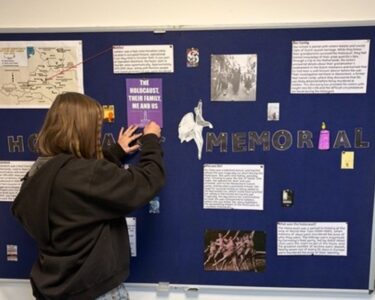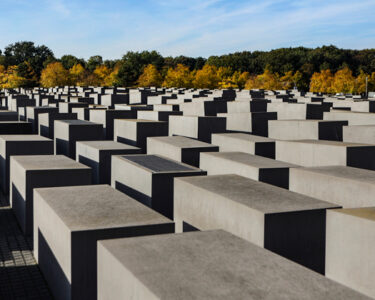In challenging and difficult times it can be easy to despair. With so much global conflict and crisis, division and hate across our political or media discourse, online and within many of our communities, it can be hard to find reasons to be optimistic. Approaching Holocaust Memorial Day within such troubling times can be difficult, challenging, and uncomfortable – perhaps the day always should be, but never has it been more important for our schools leaders to create the space to mark the day.
HMD is an opportunity to learn, commemorate and reflect, it is a chance to bring people together, in a safe educational and memorial space and in so doing create opportunities for inclusive conversations that matter, demonstrate empathy and connection and deepen and enrich both our human and cognitive understanding. It can provide light in the darkness and be a source of hope.
Hope can be found in bringing people together to learn and remember, and this week, we were proud to facilitate such an opportunity by supporting an extraordinary educational project ‘The Holocaust, Their Family, Me and Us’.
Hosted by our friends at the Imperial War Museum, our team were delighted to provide workshops to deepen and enrich student’s historical understanding, whilst doing so through the lens of three personal stories – and we were delighted to welcome Robert Rinder MBE and Bernie Graham, whose families lie at the heart of the project.
With students from Westminster Academy, Hendon School and Paddington Academy, their teachers, friends from the Pears Foundation, Dr James Smith, Robert and Bernie, our team brought people together. Learning alongside each other, conversations, deep learning, and connections were formed and throughout, the ’Fragility of Freedom’ theme was never far from our thoughts, questions, stories and discussions.
It was a powerful and memorable day of learning – the student’s engagement was wonderful, and their schools and communities can be incredibly proud of and hopeful for their thoughtful, empathetic, informed global citizens. The realities of our challenging world were present in the shared learning space, but as all good Holocaust learning and meaningful commemoration should, it was both difficult, uncomfortable but also hopeful – together we empowered each other to safeguard our futures by learning about the past.
Whether having joined the Centre’s ‘Fragility of Freedom’ online event with Professor Mary Fulbrook, or the UCL Lunch Hour Lecture, or in your leading of HMD assemblies this week, or perhaps using our resources in tutor time, we have individually and collectively played our part to educate and commemorate – and in so doing, despite our many shared challenges, worries and concerns, we collectively stand together to remember the victims or the Holocaust, and our survivor community, those affected by Nazi persecution, and genocides in Cambodia, Rwanda, Bosnia and Darfur. Our teacher and school communities marking the 27th January speaks to our common human values, your classroom, assembly and wider community endeavours across #HMD2024 are invaluable – Holocaust Memorial Day is an annual moment to re-commit ourselves to a safer world through education, commemoration, dialogue and connection.
It was a tremendous privilege to spend the day at the Imperial War Museum with so many engaged, thoughtful, and empathetic young people. The ‘Holocaust, Their Family, Me, and Us’ project is truly inspiring and thought provoking. The commemorative event was also enriched by the contributions of Rob Rinder and Bernie Graham, and we are particularly grateful to them for sharing the compelling stories of their family’s relationship to the Holocaust.
Executive Director, Professor Stuart Foster



